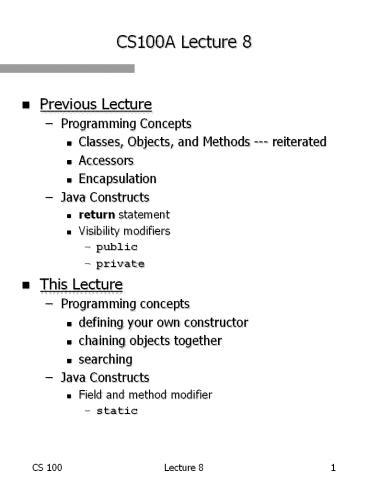CS100A Lecture 8 PowerPoint PPT Presentation
Title: CS100A Lecture 8
1
CS100A Lecture 8
- Previous Lecture
- Programming Concepts
- Classes, Objects, and Methods --- reiterated
- Accessors
- Encapsulation
- Java Constructs
- return statement
- Visibility modifiers
- public
- private
- This Lecture
- Programming concepts
- defining your own constructor
- chaining objects together
- searching
- Java Constructs
- Field and method modifier
- static
2
Problem Setting
- We wish to represent rooms
- Class Room is a collection of rooms
- Each room has a unique ID
- The ID should be automatically assigned, unique,
and immutable, i.e., not changeable. - Method findRoom(int targetId) returns the room
with ID equal to targetId, or null if there is
no such room.
3
Class Definition
- / Collection of rooms. /
- import java.io.
- public class Room
- // Each room r has a unique r.id gt 0.
- // nextId is the ID of the next room
- // to be created.
- private static int nextId 1
- private int id
- // Create a new room with a unique ID.
- public Room()
- id nextId
- nextId nextId 1
4
Constructors
- A constructor is used to create an objects.
- A class can define its own constructor.
- Class definition
- class class-name
- constructors
- declarations
- methods
- Constructor definition
- constructor-modifier
- class-name( parameter-list )
- statement-list
5
Constructor Invocation
- The value of expression
- new class-name()
- is a reference to a new object of the given
class-name - If there is a user-defined constructor with no
parameters, then it is invoked on the new object
created by new.
6
Field Declarations
- A field declarations can have field-modifiers
- Declarations
- field-modifiers type name
- Possible field-modifiers are
- public
- private
- static
- others later
- A private field is not visible from outside the
class definition. - A static field is also called a class variable.
- A class variable is not an instance variable of
each object rather, there is precisely one
instance of a class variable no matter how many
objects of the class are eventually created
7
Object Instances
- An object is a collection of instance variables
(known as fields) and methods - There is one class variable per static field
declaration
8
Problem Setting, revisited
- We wish to represent rooms
- Class Room is a collection of rooms
- Each room has a unique ID
- Method findRoom(int targetId) returns the room
with ID equal to targetId, or null if there is
no such room.
9
Method Definitions, revisited
- Method definitions
- method-modifier
- return-type method-name( parameter-list )
- statement-list
- Possible method-modifiers are
- public
- private
- static
- others later
- A private method is not visible from outside the
class definition. - A static method is also called a class method.
- A class method is invoked on the class, not on an
object of the class, e.g.,
10
Method findRoom
- // Return the room with id targetId,
- // or null if there is no such room.
- public static Room findRoom(int targetId)
- . . .
- But how are we going to find the room?
- Idea keep all rooms chained together.
- Objects can have fields that refer to other
objects - The expression
- this
- evaluated in an instance method of object o
is a reference to o.
11
Object Instances, revisited
12
Class Definition, revisited
- / Collection of rooms. /
- import java.io.
- public class Room
- // Each room r has a unique r.id gt 0.
- // nextId is the ID of the next room
- // to be created.
- private static int nextId 1
- private int id
- // For each room r, r.previous is the
- // room created immediately before
- // r was created, or null if r was the
- // first room created. The most recent
- // room to have been created is last.
- private static Room last
- private Room previous
- . . .
13
Constructor Room, revisited
- / Collection of rooms. /
- import java.io.
- public class Room
- . . .
- // For each room r, r.previous is the
- // room created immediately before
- // r was created, or null if r was the
- // first room created. The most recent
- // room to have been created is last.
- private static Room last
- private Room previous
- // Create a new room with a unique ID linked
- // to the previous room created.
- public Room()
- id nextId
- nextId nextId 1
14
Object Instances, revisited
15
Pattern for Searching
- // Search for something.
- // Start at the first place to look.
- r the first place look
- while ( r is not what we are looking for
- and
- there are still more places to look
- )
- r the next place to look
- // Now r is either what we were looking for,
- // or is an indication that there were no
- // more places to look.
16
Method findRoom, revisited
- // Return the room with id targetId,
- // or null if there is no such room.
- public static Room findRoom(int targetId)
- Room r last
- while (r ! null r.id ! targetId)
- r r.previous
- return r
- expression expression is called a conjunction.
It is true only when both operands are true. If
the left operand is false, the right operand is
not evaluated. - Note The order of the conjunction is important!
In particular, it would be wrong to use the
conjunction - r.id ! targetId r ! null
- Why?

